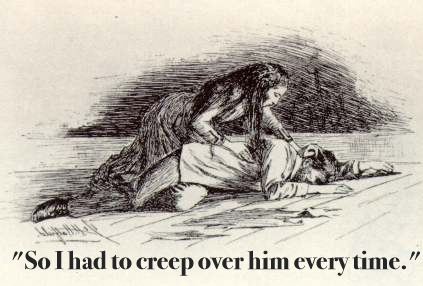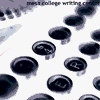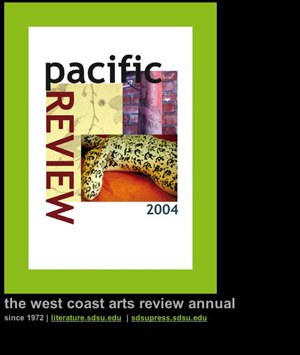This site, now closed, was the home for Leon Lanzbom's Spring 2004
Introduction to Literature class at SDSU. Enjoy the tour. Lanzbom's
current efforts can be see here! (Site Updated February 17, 2018).

TheClub
head spy
Leon Lanzbom phone: 619-594-5441
office: AH-- 4116
email:lanzbom@sbcglobal.net
office hours: MWF 9:00AM to 9:30AM
class: MWF 10AM to 1050AM
SDSU Dept. of English & CompLIT
Life is a romantic business. It is painting a picture, not doing a sum--but you have to make romance. And it will come to the question how much fire you have in your belly.--Oliver Wendell Holmes, Jr.What is The Decoder Club?
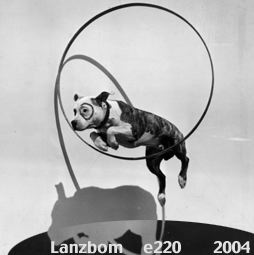
We are a group of wily vagabonds dedicated to the written word and all that springs forth from human thought. The American Heritage Dictionary of the English Language, fourth edition: Decode tr.v.:3. To extract the underlying meaning from: decode a complex literary text.Decoder n.: One that decodes. Club n.: A group of people organized for a common purpose, especially a group that meets regularly. So there you go. The Decoder Club. Us. A group of people gathered together with a common purpose: to plunge our calloused hands deep into the chest of literature and yank out its heart still beating. In this class, for three hours of our lives each week, we’re going to search for our state of equilibrium through the words and the pictures of those who searched before us. We’re going to cancel all opposing forces and listen to that little voice inside our heads. It’s that same little voice that every one of the writers we’ll study this semester heard, the voice that pleads anything is possible if only we decide it is. We’re going to realize that all art begins with a thought. We’re going to take our thoughts and coax them out of our acetycholine junctions and solidify them on paper and hold them up, transparent and quivering, to the world. And we’re going to realize that we are all artists with worth of one kind or another. And, if we really get the BIG IDEA, we're going to help each other find the still point of a moving world for at least one semester.
Who is this Leon Lanzbom guy, and why is he standing in front of our class?
I'm your lecturer moderator, and founder of The Decoder Club, yet I'm a student just like you are. I'm a student because I believe that the day we stop being students should be the day they close the top-soil door on us in that marble orchard. I know that the only difference between us is that I'm a little older, and I've sat through a few more classes and had a few more experiences than might have had. But I don't put much weight on experience.
Mark Twain, in one of his stories, gave us a cat who jumped on a hot stove and got burned. That cat was no fool; he'd never jump on a hot stove again. But the real problem was he'd never jump on any stove. There's experience for you--could be good, could be bad. The key is to never be afraid to jump on a hot stove. Maybe you'll get burned again, but, then again, maybe you won't. And imagine the view of the kitchen if you don't.
So here's my dilemma: this semester is going to be as much a learning experience for me as for you; therefore, you better be good teachers. Because I've got as much to learn as you do.
Course Materials/Texts
Required:
Literature: An Introduction to Fiction, Poetry, and Drama, 3rd compact ed., X. J. Kennedy; A Midsummer Night's Dream. Ed Wolfgang Clemen. Signet a good handbook--optional (e.g., A Writer's Reference or MLA Handbook), a notebook for in-class writing and storing all class materials a reasonable dictionary.
Course Objectives/Description
The AssignmentsThe secret of realizing the greatest fruitfulness and the greatest enjoyment of existence is: to live dangerously! Build your cities on the slopes of Vesuvius! Send your ships out into uncharted seas! Live in conflict with your equals and with yourselves! Be robbers and ravagers as long as you cannot be rulers and owners, you men of knowledge! The time will soon pass when you can be satisfied to live like timorous deer concealed in the forests. Knowledge will finally stretch out her hand for that which belongs to her - she means to rule and possess, and you with her!"
Book IV,Fröhliche Wissenschaft
Friedrich Nietzsche
Five out-of-class Inspirational Critiques, one to one and a half pages (300 words absolute maximum) each. Two in-class Cataclysmic, Shake-Down Exams In-class writings/startle-response quizzes (announced or unnanounced)
One cumulative Final Exam
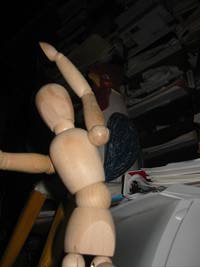
Physiology of Grading:About the five Inspirational Critiques:
What I am looking for in these critiques is who YOU are. These assignments will reflect what doors our readings have opened for you, or what doors our readings have closed for you, and why. The brunt of your grade on these will depend on how much of YOU I sense in your writings. I don't want you to toss back what I've told you in class. Anyone can do that. I want to see if what we discuss has adulterated and amalgamated and blended into your bioelectrical chemistry. I want to see how you compare readings. I want you to dig just a little bit deeper than you normally would and come up with a work that is a reflection of who YOU are.
About the two Cataclysmic, Shake-Down Exams:
There will be two objective in-class exams. These exams will cover all vocabulary words and will be geared more toward the technical/ analytical side of what we study.
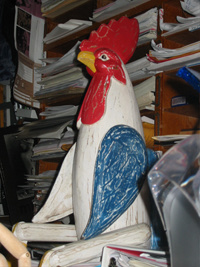
About in-class writings, startle-response quizzes, participation, attendance:This is all about "being here now." I will occasionaly toss a startle-response quiz your way or an unnanounced writing assignment. In this section class participation and attendance will carry lots of weight.
About the Final Exam:
The final will be cumulative and will reflect most of what we did in class. I will not force the obscure upon you, such as Tell me the time and date and the latitude and longitude of Whitman's last breath? The Exam will be on material that we emphasized in class.
On Grading:
- With an “A” I would make few or no changes to content or grammar. They reflect a writer who is in full control of both material and language.
- “B” papers exhibit thinner information. The reader wants/needs more. Examples or illustrations may feel slightly forced or exaggerated.
- “C” papers are awkward, do not read smoothly aloud, and they tend toward fuzziness and lack of assurance on the part of the writer. The reader has difficulty understanding the text.
- “D/F” papers are usually hasty, careless, inattentive, or off-topic
The percentage value of course work is as follows:
NOTA BENE: I do not accept late work. All assignments must be submitted in class on the assigned due date. No quizzes or other in-class writing assignments may be made up without prior arrangements made with me.
- Inspirational critiques (5) 10.0% (10 pts. each = 50 pts.)
- Cataclysmic, shake downs (2) 40.0% (100 pts each = 200 pts.)
- In class quizzes, attendance, participation 10.0% ( = 50 pts.)
- Final Exam 40.0% ( = 200 pts.)
- 100.0% = 500 pts.
Attendance:
The whole point of this class is to work together, creating an intellectual sum greater than its parts. If you miss class, you are taking away a vital part of the class mechanism, you. As such, miss no more than three classes (3) during the semester; note that you are responsible for any work which you miss or assignments you elect to ‘bail on.’ One last unpleasant matter: if you miss more than three sessions, you will be dropped one letter grade. For example: If you have an A- and 4 absences you will receive a B+. This is not negotiable. If you believe you have an extreme circumstance, please see me.
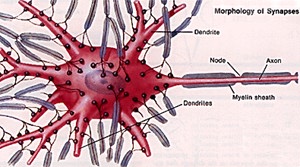
Attitude:When you walk into class each day on time, you will have read all that has been assigned to you for that day. There are no excuses for missed preparation as reading assignments for a given day are clearly stated in your syllabus. This may strike you as a bit harsh but the rule is quite simple: If you do not prepare the readings, you are not welcome in class. Why? Because this seminar depends upon the contributions of its participants--without your input, the class is likely to evolve into a boring, one hour waste of life.
Late Work:
I do not accept late assignments. Assignments are due at the beginning of class, in the class session—not in my office. If you believe you have a legitimate reason for submitting an assignment beyond the due date, see me.
No quizzes or in-class writing assignments may be made up without prior arrangements made with me.
You must submit all assigned work in order to pass this course—regardless of your total points earned for the course.
Daily Menu Disclaimer: You may find the language, or the sexual or violent content of some of the material submitted or assigned in this class offensive. I generally do not censor class reading material. Please see me if you feel offended. I will offer alternatives for any assignment. Imagination is more important than knowledge.For the next five weeks or so, we're going to take a peek at a gathering of marvelous warhorses of poetry: Yeats, Frost, Dickinson, Whitman, Roethke, Williams, Donne, and more. We will read their works as if we were part research scientists and part street poets, examining the subjective and the objective, piecing together what makes these lines tick yet timeless, discovering what spark yields life, life, LIFE to each of these poems.--Albert EinsteinBUT
to break up the poetic monotony, somewhere around week 3 or 4 we're going to view the perfect perceptual vehicle for our journey into the world of semiotic decoding, Michelangelo Antonioni's Blow Up.
Week 01 January 12-16
Reading a Poem 455-7; Creely, "Oh No" 485; Yeats, "The Lake Ise of Innisfree" 457; LYRIC POETRY 460; Lawrence, "Piano" 460-1; NARRATIVE POETRY 462; Frost, "Out, Out--" 464; TONE 471; Roethke, "My Papa's Waltz" 472; Cullen, "For a Lady I know" 473; Whitman, "To a Locomotive in Winter" 474-5; Dickinson, "I Like to See It Lap the Miles" 475; Wordsworth. "I Wandered Lonely as a Cloud" 481-2.
Week 02 January 19-23
Stephens, "A Glass of Beer" 483; Williams, "The Red Wheelbarrow" 484; IRONY 484; Auden, "The Unknown Citizen" 486-7; Hardy, "The Workbox" 488-9; Williams,"This Is Just to Say" 500; Donne, "Batter My Heart. . ." 503; VALUE... 504-05; Cummings, "Anyone Lived in a. . ." 515-6; Carroll, Jabberwocky" 518-21; Critique 1 DUE 1/23
1/19 Holiday—Martin Luther King Jr. Day. Campus Closed.
Week 03 January 26-30
IMAGERY/ Pound, "In a Station of the Metro" 535-6; Shakespeare, "Shall I Compare Thee. . ." 557-8 & Moss, "Shall I Compare Thee. . ." 558; METAPHOR 559-60; Blake, "To See a World in a Grain of Sand" 561; Burns, "Oh, My Love is Like. . ." 570; Wallace Stevens, "Anecdote of the Jar" 678;
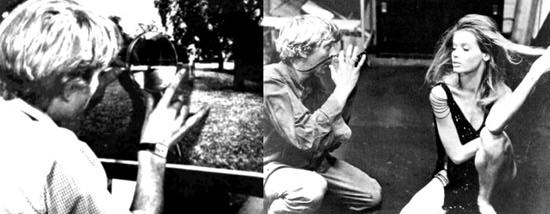
And while we're on the subjects of Imagery and Metaphor, if things go as planned, we'll view our first in-class film in Teatro 206: Michelangelo Antonioni's Blow up. We'll turn down the lights androll the cameras and watch as a photographer named Thomas (David Hemmings) goes through the hermeneutical process, his own textual decoding of signs, trying to read the true meaning of events that happened in a park while he was taking photographs.
Week 04 February 2-6
ALLITERATION 598; Keats, "This Living Hand. . . 633; Ginsberg, "A Supermarket in California" 805; Shakespeare, "That Time of Year. . ."844; RIME 600-1; Hughes, "Subway Rush Hour" 764; Frost, "The Road Not Taken" 674; STRESSES 612-6; Brooks 616-7; METER 619-24; Blake, "The Tiger" 787; CLOSED FORM 631-2; Thomas 644; Addonizio, "First Poem forYou" 640.
Critique 2 DUE 2/6
You work for a literary/ film agency, and you are presently reviewing poems for possible publication (by coincidence, these happen to be the poems we’ll be doing up until Critique 2 is due). One morning Michelangelo Antonioni’s Blow up sits on your desk for review. You view the film, and you need to make recommendations to the owner of the agency. Using a professional source as your guide (Here are two sources to get you started: New Yorker: http://www.newyorker.com/critics/theatre/ or The Reader: http://www.sdreader.com/ed/mv/movies.html ), you should write a carefully considered analysis of what is memorable, complex, significant, problematic or confusing about the film, and use one of our poems as your reference point.
You may want to focus on Imagery, Narrative, Tone, Irony, Personification, Metaphor, Ironic point-of-view or anything else that comes to mind.
Good Luck!
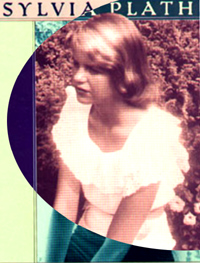
2/2 Last day to add classes, drop classes, change grading basis, or apply for course “forgiveness.” No schedule adjustments after this date. Also, last day to WITHDRAW without penalty fee for spring 2004
Week 05 February 9-13
OPEN FORM 650; Elizabeth Bishop, "One Art" 731; SYMBOL 667-8; MYTH 682-4; Lowell, "Skunk Hour" 825; PERSONAL IDENTITY 699-700; Plath, "Daddy" 834; RECOGNIZING EXCELLENCE 718-20; Exercise 721-3; Shelley, "Ozymandias" 728; Shakespeare, "My Mistress' Eyes. . ." 729; Hughes, "Theme for English B" 764-5:
Run for your lives! It'S THE FIRST CATACLYSMIC, SHAKE DOWN EXAM:
Poetry 2/13.
Decoder Club Poetic Cryptograms:
Verbal Irony
Ironic Point of View
Dramatic Irony
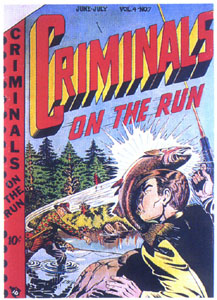
Metaphor
Implied Metaphor
Simile
Synechdoche
Metonomy
Personification
Stanza
Quatrain
Hegemony
End Rhyme
Internal Rhyme
Slant Rhyme
Consonance
Assonance
Imagery
Subject
Theme
Lyric Poem
Narrative Poem
Tone
Satiric Poem
Meter
Sonnet
Rhythm
End Stop
Run-on-Line
Villanelle
PART II: FICTION
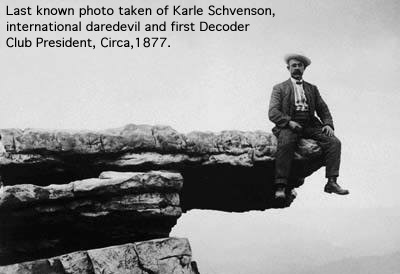
We now enter PHASE TWO of our Decoder Club literature extravaganza: FICTION! The short story. The short story is one of the more difficult writing forms in the literary landscape. These stories may be short in length, but many of them are constructed with judicious, penetrating, systematic precision. The short story artist doesn't have the luxury of pages or even chapters to set up his/her setting, theme, character, plot, and point of view. S/he must do it within the confines of a page, a paragraph, or even a sentence. We're talking about prose works so close to poetics, you'd swear they were the illicit offspring of Emily Brontë's Wuthering Heights and Kim Addonizio's "First Poem for You." So don your Decoder Club spy monocles, pull out your dusty old prescriptive copy of Webster's Second, lock your secret clubhouse doors, and get set for the ride of your lives.
Week 06 February16-20
Monday 2/16: READING A STORY, including Maugham
"The Appointment in Samarra," (4-5), Aesop's "The North Wind and the Sun," (5-6), Chung Tzu "Independence," (6-7), and the Grimm's "Godfather Death," (8-10). Make sure you also read "Plot," starting on page 11, and "The Short Story," starting on Page 12 . All-in-all, the pages to be read are 3-13.
Wednesday 2/18: John Updike "A&P" 14-19; Joyce "Araby" 398-402.
Friday 2/20: Faulkner "A Rose for Emily" 28-35; Gilman "The Yellow Wallpaper" 365-77.
Week 07 2/23-27
Monday 2/23: Kincaid "Girl," 405-6; Walker "Everyday Use," 88-95.
Wednesday 2/25: Singer "Gimpel the Fool," 95-106.
Friday 2/27: Chopin "The Storm" 114 ; Critique 3 DUE 2/27 (see below).
Oh No! It's CRITIQUE Numéro Trois! Due 2/27

Yes, yes, yes, here we go again. Break out your pencil and paper and show the world what you're made of! We are not humans; we are not beasts; we are not even things! We are. . .we are. . .writers! (at least for this semester)
Waddayagottado?
Find any photograph, illustration, or work of art that inspires you. Get a copy of this work and compare it to one of the short stories we are reading. Keep it simple! Use whatever work of art you find as your muse--think of it as an inspiration for your creative processes.
The rules are the same as previous critiques we've done. Stay within MLA guidelines for your headings and for your work's cited. Beyond that, have fun!
Week 08 3/1-5
Monday 3/1: Finish Chopin "The Storm," 114: Boyle "Greasy Lake," 119-126.
Wednesday 3/3: Hawthorne "Young Goodman Brown," 378-88; Bierce "An Occurance at Owl Street Bridge," 332-8.
Friday 3/5: Catch up on short stories that need attention; Hemingway "A clean, Well-Lighted Place," 149-52.
Week 09 3/8-12
Monday 3/8: Vonnegut "Harrison Bergeron," 201-6; Jackson "The Lottery," 221-28.
Wednesday 3/10: Oates "Where Are you Going, Where Have You Been," 422-34.
Friday 3/12: O’Brien "The Things They Carried," 435-47; Lanzbom "Ten Years."
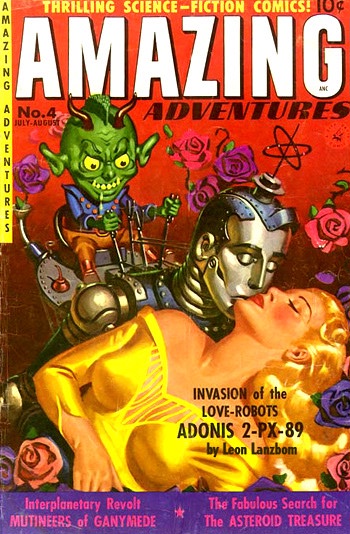
Spring Break
Week 10 3/15-19Welcome Back!

Week 11 3/22-26Monday 3/22: Carver "Cathedral," 289-323.
Wednesday 3/24: Carver Cont.; O’Connor "Good Country People," 247-61. (DROP)
Friday 3/26: O'Connor "A Good Man Is Hard to Find," 262-73 (SKIP); Critique 4 DUE 3/26.
We're Ready for New Adventures!
We're Ready for New Dangers!
We're Ready for Critique Numéro Quatre! Due 3/26
You're back from Spring Break. You're dog- tired. You're weary of Cabo, irked by all that partying, had it up to here with philandering, and frivolity, and you can't wait to hit those books again. Well, now you can rejoice, for here comes your wake-up call. Say goodbye to conga lines and say hello to another Critique. Yes! Critique number four to the rescue. We're going to heat up the RCA tubes in our word processors and fire off our neurons and put together an amazing academic explication on the short stories we've been reading. Here's what we're going to do:
Let's travel back to any one of the short stories we've read. We're going to put your artistic side to the test. Here's your assignment: You're going to hermeneutically (remember, interpret or explain) the story of your choice in both words and illustrations. In other words, in one or two pages you're not only going to write a brief summary of the story of your choice, but you're also going to illustrate it. Do it any way you choose. You may want to draw your pictures in the margins, or you may want to write a paragraph, and then draw your picture below that paragraph, the way you would see it in a picture book. If you get stuck, you can use this very website for picture placement ideas. You're essentially going to create your own picture book critique! You may even want to include a photo or painting that you think pertains well to the short story you've chosen. The creative part is your call.
Just added! Now you have a choice: either do the assignment above or the assignment below.
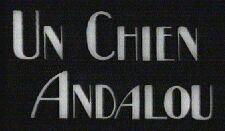
This classic film by Luis Buñuel and Salvador Dali, circa 1928, was made to attract the attention of the Avant Garde movement. These two swashbuckling artists wanted to create a film whose "only rule was very simple: no idea or image that might lend itself to rational explanation of any kind would be accepted." Buñuel took stones to the premiere to toss at the critics. But something more bizarre than the film itself happened. The bourgeoisie loved it! Buñuel and Dali were puzzled. Buñuel wrote:
"What can I do about the people who adore all that is new, even when it goes against their deepest convictions, or about the insincere, corrupt press, and the inane herd that saw beauty or poetry in something which was basically no more than a desperate impassioned call for murder?"
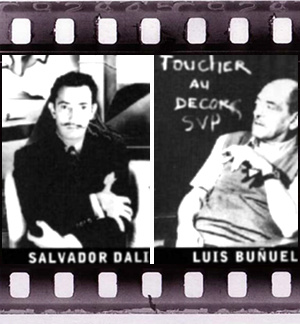
Seventy-years later, here we are in teatro 206 experiencing the same astonishment those first audiences experienced
"A movie like this is a tonic. It assaults old and unconscious habits of movie going. It is disturbing, frustrating, maddening. It seems without purpose (and yet how much purpose, really, is there in seeing most of the movies we attend?). There is wry humor in it, and a cheerful willingness to offend." - Roger Ebert ****
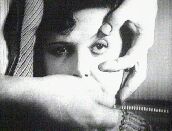
Draw what you view to be the most memorable or confusing image from Dali and Buñuel's UN CHIEN ANDALOU. On another piece of paper taped to that drawing, write a one page essay that describes your rationale and/or speculates upon the complexities of the particular image you selected.
REMEMBER. YOU NEED ONLY CHOOSE ONE ASSIGNMENT.
Good Luck, Decoder Club Kids. You'll need it!
Week 12 3/29-4/2
Fiction catch up and review; EXAM 2 Fiction 4/2.
Decoder Club "Short-Story" Cryptograms: Fiction
Fable
Parable
Fable vs. Parable
Tale
Short Story
Fable, Tale versus Short Story
Fairy Tale
Fantasy
Plot
Exposition
Complications
Climax
Dénoument
Protagonist
Antagonist
Conflict
Foil
Foreshadowing
Crisis
In medias res
Epiphany
Setting
Point of view
Narrator
Omniscient Narrator
First Person Narrator, participating
Third person Narrator, non participating
Setting3/31 Cesar Chavez Day. Campus Closed.
Part III: DRAMA
We now enter the last phase of our Decoder Club mission: drama. The word "drama" is derived from the Greek word dran, "to do." To do? To do what? To perform damn it, perform! The play is the thing! Drama is literature premeditated for performance. Drama inovolves the reader. From an inanimate piece of paper with little black squiggles on it, drama barks its orders--roles are played; actions are assumed; dialogue is spoken. How in God's litle green acres does drama wield such power, such force? For the next five weeks we're going to find out. We're going to force drama's hands to the wall and frisk down this fun-loving-criminal of literature. And if all goes according to plan, we'll uncover, discover, and understand the calculating, clever, and sometimes sordid mind of the prose and verse of performance.
William Shakespeare

Now we're in for a real treat--the one, the only William Shakespeare or "Shakey" as the critical theorists are fond of calling him. William Shakespeare, the man, the enigma, his writing so perfect that certain academics in need of recognition have claimed that Shakespeare didn't exist. But we know better, don't we? Mr. "inductive reasoning" himself, Sir Francis Bacon, had nothing on Shakespeare. Born 26 April 1564, died 25 April 1616, Shakespeare was one of those human beings who mentally dwelt somewhere in the ether, like Mozart, like Emily, like Blind Willie Johnson. One of the few writers of our species to bridge the masculine-feminine nether zone, Shakespeare had enough passion, grace, and strength to write like a woman or a man. He was a radical, a wildman, and a good father. So don't let the language of Shakespeare scare you (it's actually considered modern English). Open your mind and give one of our greatest writers a chance. Let his subtle technique of counterpoint and juxtaposition, his strands of plot, his illusion, his wonder, his strangeness, and most of all, his passion for life, death, and love take hold, and you just might find yourself another notch on Shakespeare's fan belt.
We are about to embark on a journey into a wonderful world of contrasts, divergent elements, and the power of comedy meets poetic imagination. A Midsummer Night's Dreamconnects to the Elizabethan's "midsummer madness," a state of mind brought about by those sweaty days of summer heat. Superstitions, folk customs, dances, pageants, revels, enchantment and witchcraft are all embodied in this fairy world created by Shakespeare. We will devote two weeks of our lives to this great comedy. I hope that someday, when you find yourself working for the marketing department of Proctor and Gamble, you'll think back to these days of studenthood and glorious freedom. You'll think back to when you were afforded the privilege of learning about Theseus and Hippolyta, Hermia and Lysander, Puck and Bottom, and you'll realize how fortunate you were. But better yet, why wait? Luxuriate in your good fortune now!
Week 13 4/5-9
Shakespeare A Midsummer Night's Dream 3-59.THE FOLLOWING IS A BASIC OUTLINE. TO UNDERSTAND BETTER HOW SHAKESPEARE'S DRAMA WORKS ON THE STAGE, WE WILL ALSO TRY TO FIT IN A FILM OF THE PLAY .
Monday 4/5: Act I, 3-16.
Wednesday 4/7: Act II, 17-32; Act III Scene I, 33-40.
Friday 4/9: Act III Scene II, 40-59.
Week 14 4/12-16
Shakespeare, A Midsummer’s Night Dream 59-86; Critique 5 due 4/16Monday, 4/12: Act IV, 59-70.
Wednesday, 4/14: Act V, 70-86
Friday, 4/16: Catch up; Critique 5 due (see below)
Critique numéro cinq (5): Due 4/16

In this, your last Decoder Club critique, you're going to finally be able to show the world the stuff you're made of. You're going to write your own drama or short story. Your choice. In this paper, you're going to come up with your own stage directions, characters, plot, foreshadowing, point-of-view, conflict, climax, epiphany, etc. You may want to base your "style" of writing on one of your favorite Decoder Club authors. You may want to get into detail, like Hemingway, or family issues, like Alice Walker, or use the commonplace but precise language of Carver, or strands of plot and subplot like Shakespeare.
For this paper the chickens are going to be let loose from the hen house. The minimum length will be the same as always, approximately 300 words, but if you find yourself going over that limit, it'll be fine.
Any illustrations or pictures you decide to use as part of your paper will be joyfully accepted.
This is your last paper for the Decoder Club. Go for it!
Arthur Miller
Death of a Salesman made" Arthur Miller. The play was first performed on Broadway on February 10, 1949, directed by Elia Kazan, with Lee J. Cobb cast as Willy Loman. Miller had wanted to call the play The Inside of a Head, planning to offer a huge head on stage that would open up, so the audience could view its white and gray matter. But someone must have talked some sense into the man, and he settled on what we have today.
Death of a Salesman is about that awful moment of self-awareness, that moment when a man looks back over his life and realizes that the book of life he meant to write for himself turned out very different from what he thought it would be. And to make up for it, he then rises to the call and offers the ultimate sacrifice.
Week 15 4/19-23 : Miller Death of a Salesman 1177-1251.
FRIDAY 4/23: GUEST ROBERT EARL!

"Who the hell is Robert Earl?" They ask.
"Why don't I let "About the Author" tell you," he answers.
"Robert Earl is a formulated, controlled body slam through life, once quoted as being the Martha Stewart of youth culture by Fortune magazine. He has graced the pages of numerous publications, and his ability to walk confidently through dog parks barefoot has somehow opened the doors to major corporations. His scabs of fifteen years in the action sports industry will show signs of Arnette Optics, Jones Soda, Activision, and Sprite. He's also a featured personality on Tony Hawk's Gigantic Skatepark Tour on ESPN, and in the Billabong surf epic Pickled. Maybe you've seen his feature interviews year after year at the X-Games, heard his melodious voice gracing the radio on Live 105, or even had the pleasure of hanging up on him when his visions of grandeur morphed him into the caricature of an evil Kryptonian villain. In any case, Robert Earl is a planned accident waiting to happen, and he's coming to a town near you."
As it says on the cover, Robert Earl's book, X-treme Cuisine is filled with "recipes, interviews, etiquette, and secret tips from the greatest personalities in surf, skate, snow, and BMX." In my opinion, this book is the perfect study for an English 220 class in Southern California. Rob will be talking about how he put X-treme Cuisine together and how he scored a publishing deal with Harper Collins,, and lots more.
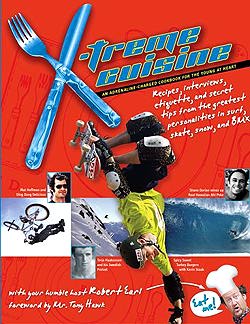
This, being a literature 220 class, you might wonder, what does a cookbook have to do with literature? The American Heritage Dictionary, fourth edition, defines "literature" as "1. imaginative or creative writing." Well, move over Faulkner, stand aside Hemingway, and sit your ass down Oates; you're not going to find another book more imaginative and creative than X-treme Cuisine. Robert Earl's book gives us more than a cookbook. X-treme Cuisine offers a wonderland of graphic art and illustration, and there are hundreds of little blurbs, both literary and not so literary, placed strategically throughout the book. In these times, when the world of literature is turning to graphics, film, and illustration far more than it ever has, where the modern-day novel of today's youth may very well be the film The Matrix, X-treme Cuisine fits right in with the literary canon.
The doors will open to all students and faculty on Friday, so bring a friend or two, and get ready for a unique hour of class.
EXTRA-CREDIT ALERT!! Enough yelping! Your cries of sufferance have been heard once more by your most benevolent club leader, and it is with benignity, magnanimity, and caritas that one more extra-credit alm be tossed your way. It is time to let you go from the womb, to let you finally prove that all your Decoder Club training had some sort of meaning. So here it is. . .
This Saturday 4/24/04, our University will be hosting the "Border Voices Poetry Fair." Between 11:15 a.m. -12:10 p.m., Sandra Cisneros performs in Montezuma Hall and hands out awards to elementary school students. She will then sign books immediately afterward. Your job is to get a copy of her 1984 best-seller, The House on Mango Street, and get her to sign it! Come back to class with the goods, and the extra credit is yours. It'll be like taking candy from the "the bard of the borderlands."
Good luck Decoder Club trainees. Come home safe.
Week 16 4/26-30 Catch up and poetry/drama reading week.
Week 17 5/3-7
FINAL EXAM dates to be announced. Leave SASE for return of any remaining materials/grades.
Please Note: Dates of readings are “to be done and discussed on” dates.
***THIS CALENDAR SUBJECT TO CHANGE*
Reference Materials & Expired Extra-Credit Junkets

more info

Extra Credit, encore!
Your assignment, if you should choose to do it, is to visit (in cognito, of course) MOPA in Balboa Park where you'll find the Robert Parke Harrison Exhibit titled "The Architect's Brother." Write a short, one page in length, review of one photograph that catches your eye (see blurb below on 'how to do extra credit). Carefully and safely gather together evidence that you were actually at MOPA (an entrance receipt is fine), and attach it to your super secret report. For your perusal, here are some of the sordid details straight out of the Museum of photographic Arts' website file:Robert Parke Harrison: The Architect's Brother
January 11, 2004 - April 4, 2004
In this exhibition, Robert Parke Harrison presents a series of photographs that tell stories of loss, struggle, and personal exploration within landscapes scarred by technology and over-use. He attempts to metaphorically and poetically link his laborious actions, idiosyncratic rituals, and strangely crude machines into tales about our modern experience. The images and the process of their construction embody aspects of theater, sculpture, painting, photography and performance. This exhibition will be displayed in the main galleries.
If you can't make MOPA, there are other options:
FILM!
2/20-2/26: Secret Things, winner of the Cahiers du Cinéma, playing at Landmark's Ken cinema, 4061 Adams Avenue (619) 819-0236 (or any other film that fires off your neurons)
ART!
The museum of Contemporary Art, La Jolla, 700 Prospect Street, La Jolla.
There's a cool exhibition going on there right now:BAJA TO VANCOUVER: THE WEST COAST AND CONTEMPORARY ART
JANUARY 23 - MAY 16, 2004
Featuring over fifty paintings, sculptures, installations, photographs, drawings, and video works by thirty-three contemporary artists, Baja to Vancouver:
HOW TO DO EXTRA CREDIT:
You are J. Hoberman and write for the Village Voice magazine, or you can be John Leonard, who writes about books for The Nation, or any reviewer of your choice from Rolling Stone: go to one of the exhibits or films and review it. You MUST write in a style as close to Hoberman and Leonard as you can--that is HALF of the assignment.
www.villagevoice.com
www.thenation.comor
www.rollingstone.com
--1 page typed
--double-spaced
--written expressly in the STYLE of the magazine you select.
--carefully proofread
--illustrated if you wish
--catchy title
--lots of attitude! (be as critical, smart-assy, savvy, cynical as you wish).I will also offer the option of doing more than one extra credit assignment for those so inclined.
REMEMBER: attach your entrance receipt to your paper! You need evidence that will hold up in a court of law!
When are these extra-credit assignments due? By 3/12 (before Spring Break) in class.
shortcut to MLA style-sheet


memographix
Want to see what Lanzbom is up to now?
Follow these links:
(Note bene: the late great Leon Lanzbom passed away March 25, 2011
--this site is maintained as a tribute to his eccentric genius).
